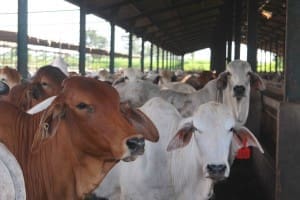Exporters are anticipating possible disruptions to beef and cattle exports to Indonesia early next year.
The Indonesian Government has advised importers that import permit recommendations for the first quarter of 2015 have been suspended pending an evaluation of import policies.
The new Indonesian Government has expressed concern that the new “reference price” system for determining beef and cattle import volumes has failed to trigger a meaningful reduction in beef prices, and is reviewing the policy.
Just over 12 months ago the-then SBY Government replaced the quota based system for determining beef and cattle imports to Indonesia with a new reference price system that tied import levels directly to the price of beef in Indonesian wet markets.
Under the new system, imports are allowed to flow when wet market prices are above a reference price (initially set at IDR 76,000/kg and recently revised up to IDR 85,000/kg), in order to improve supply and allow prices to ease.
Conversely, imports would be restricted when wet market prices fall below the reference price point.
The new policy led to a massive increase in the volume of cattle and boxed beef shipped from Australia to Indonesia in the past 12 months.
However, despite that big increase in supply, wet market prices have remained stubbornly high, with consumers still paying over IDR 90,000/kg.
In comments to the trade this week Indonesia’s Director General of Trade Partogi Pangaribuan indicated that the Indonesian Government is concerned the new policy has not worked and that it will be re-evaluating beef and cattle import policies.
Consequently importers have been advised that a halt has been placed on the issuance of recommendations for import permits for both cattle and beef for 2015 until that review is conducted.
One live export industry source who asked not be named described the development as “worrying”, saying it may cause early disruptions to the trade in the new year.
Another Indonesian-based beef importer told Beef Central yesterday that he understood the recommendations for import permits for 2015 are suspended subject to a meeting with the Director General of the Ministry of Trade today.
“We are hoping for the best outcome,” he said. “The trade department seem to want the permit issuance to go ahead for Q1, and evaluate only Q2 onwards.”
Clarification on 350kg rule
An earlier article on Beef Central this week reported that Indonesia has reintroduced a 350kg weight limit.
Senior Australian live export industry members have advised that the 350kg weight limit has never been taken away, but what has changed is that the special permits issued for the import of heavier slaughter-weight cattle over the past 12 months are no longer being issued.
Australian Livestock Exporters’ Council CEO Alison Penfold said the 350kg limit was regulated prior to 2010 and the market has predominantly been a feeder cattle market since that time.
“Slaughter cattle were only provided permits last year as an emergency provision when Indonesia was very short of supply during the religious festival and needed beef rapidly,” she said.
“As slaughter cattle weren’t mentioned in the recent regulations, it would appear that the Indonesian Government is indicating an intention not to issue further slaughter cattle permits at the present time.”
Q1 to Q3 saw 581,000 head of permits handed out of which 117,765 were for slaughter cattle (20pc). This figure was for APFINDO members only, which covers most but not all Indonesian importers.
Market awaits clarity on import permits for Q1 2015
News that the Indonesian Government is re-evaluating cattle and beef import policies has sparked rumours of a possible reintroduction of import quotas in 2015 and possibly another ban on imported frozen offals.
It has to be stressed these are just rumours but once again the trade finds itself guessing as to what lies ahead.
A live export stakeholder with a long history in the trade said he hoped the Indonesian Government’s review will take into account other reasons that have kept beef prices in Indonesia persistently high.
These included the 5pc import duty the Indonesian Government imposed on cattle imports in 2013, which immediately added IDR 5000/kg to the price of beef in the market.
The disparate nature of the supply chain in Indonesian wet markets was also a factor, with middle men able to hold margins longer which kept consumer beef prices high, even though the price of cattle finished in feedlots had come down.
“Cattle prices in 2014 ex-feedlot have been lower than the previous two years. The Indonesia Government cannot complain that prices have not come down. At the feedlot they have and they are ignoring this fact.”

